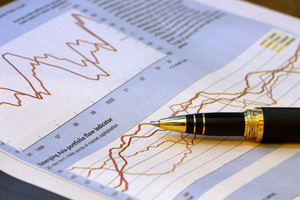Capital Markets for Investors Interested in Debt and Equity Securities
The capital markets enable investors to trade equity and debt securities and structured products. Governments, corporations, and companies trade securities to raise capital.
Types of Instruments
Stocks and bonds are traded on the capital markets. They are usually purchased by high net worth individuals, sovereign wealth funds, hedge and pension funds, and other entities. Other debt instruments that are traded include:
Companies issue industrial loans and debentures while local, state, and federal governments issue municipal, state, and sovereign bonds. There are different types of bonds such as perpetual, inflation-indexed, covered, exchangeable, subordinated, convertible, etc. Other examples include high-yield, zero-coupon, and floating rate notes that come with a variable coupon. In this case, the rate fluctuates and is tied Euribor or LIBOR. Other instruments are also traded on the secondary and primary markets, including derivatives, preference shares, and common stock. Derivatives come in different types, including:

Options, Swaps, and Exchange Traded Commodities
Options allow investors to trade bonds, stocks, and other instruments. A swap is a type of derivative that is used to hedge risk. Factors that pay a role include the commodity or equity price, foreign exchange or variable interest rate, and others. Examples of exchange traded commodities include industrial and precious metals, energy, livestock, and others. They are traded on the International Petroleum Exchange, Chicago Mercantile Exchange, EURONEXT, and other exchanges. Commodities traded on NYMEX include heating oil, natural gas, ethanol, crude oil, and others. Precious metals such as silver, platinum, gold, and palladium are traded on COMEX. In addition, investors buy and sell industrial metals such as recycled steel, cobalt, nickel, zinc, and lead. The main exchanges are Rotterdam and the London Stock Exchange Renewable energy certificates and carbon offsets are also traded on the European Energy, Commodity, and European Climate Exchange. They are regulated by bodies such as the National Futures Association and the NASDAQ OMX Commodities.
Other Types of Derivatives
Mortgage-backed securities are debt instruments that are backed by mortgage loans. The main types are to-be-announced securities (TBAs), secondary mortgage market, and covered bonds. The latter are used by different entities as an affordable source of financing. Investors also buy preference shares that have features of debt and equity securities, making them a hybrid product. There are different varieties such as redeemable, non-convertible and irredeemable, and convertible and irredeemable. Redeemable preference shares fall in the category of debt instruments. Common stock or equities are also traded in the secondary and primary markets. Investors who buy stock enjoy certain privileges, including the right to hold position and vote. They also receive dividends, which is a form of payment to stockholders. There are different types, including interim, property, scrip, and cash dividends. In general, common stock is traded by investors with a high-risk profile and yields a higher return compared to other instruments.
Debt vs. Equity Instruments
Debt securities are issued by government bodies and businesses to raise capital. The interest rate is either variable or fixed, and interest is paid annually, semi-annually, or quarterly. Government bonds are safe to invest in, with a tenure of up to 25 years. They are suitable for conservative investors with a low-risk profile. The main difference between bonds and commercial paper and certificates of deposit is that the latter are considered money market instruments. There is also a difference between stocks and bonds. Bondholders buy debt securities and have a creditor stake. Stockholders, on the other hand, buy company equity. Both conglomerates and individual investors buy securities in the form of common stock. Some investors also buy private stock which is more expensive. They benefit from higher returns (dividends).
Participants and Markets
The main participants, both issuers and investors, include entities such as:
Debt and equity instruments are bought and sold on the primary market where new securities are issued. Businesses use primary issues for different purposes – to modernize and buy machinery and equipment, expand to new markets, or set up a new business. Securities are also traded on the derivatives, bond, stock, and other secondary markets. Futures, options, bonds, and stock are traded. Both liquid and illiquid assets are offered to investors. The main exchanges are the New York, Toronto, London, Tokyo, Hong Kong, and NASDAQ. Corporate bonds are mainly traded on the American, New York, and other stock exchanges. There are also regional stock exchanges located in major centers such as Philadelphia and Boston. Different entities and individuals complete financial transactions, including brokerage firms, dealers, stockbrokers, and others. The over-the-counter or third market is where securities are traded directly. The main benefits for investors are anonymity and access to liquid instruments. Institutions also trade directly on the fourth market.
Related Articles
Types of Derivatives to Include in Your Investment Portfolio
Derivatives come in many varieties, and their value is derived from an underlying asset such as an interest rate, index, or asset. Examples of underlying assets include market indexes, currencies, commodities, bonds, and stocks. Types of Contracts There are different financial instruments such as:...
Yield on Debt Securities and Other Investment Instruments
Yield refers to the amount of money that owners receive in exchange for investing in some security. It is a set rate of return on insurance policies, fixed income securities, and stocks and bonds. Investment Products that Offer ReturnIndividuals and companies invest in different products, including...
Securities as an Instrument to Trade and Invest
A security is a type of financial instrument that can be traded for cash. The three main categories of assets are derivative contracts, equity, and debt securities. They are issued and traded by businesses, corporations, government agencies, and municipal authorities. The majority of investment...
Bond Funds as a Way to Invest in High-Grade Securities
Bonds funds invest in debt securities such as convertible, municipal, corporate, and government bonds. They also buy mortgage backed securities and other investment solutions. The main benefit for investors is that they are paid higher dividends compared to money market instruments and certificates...
